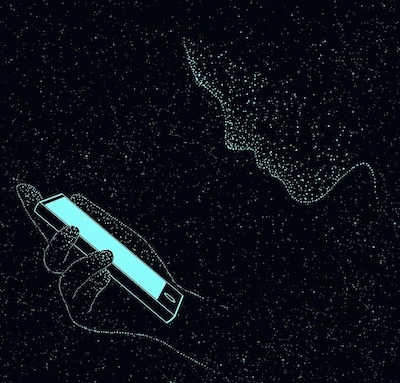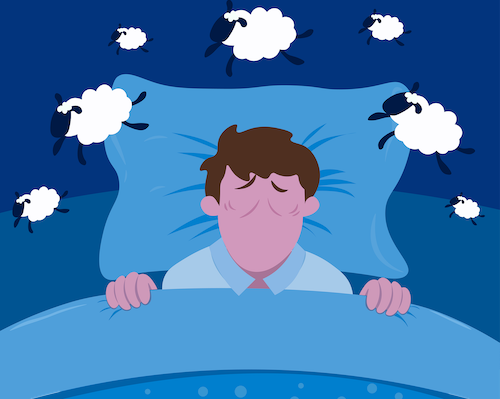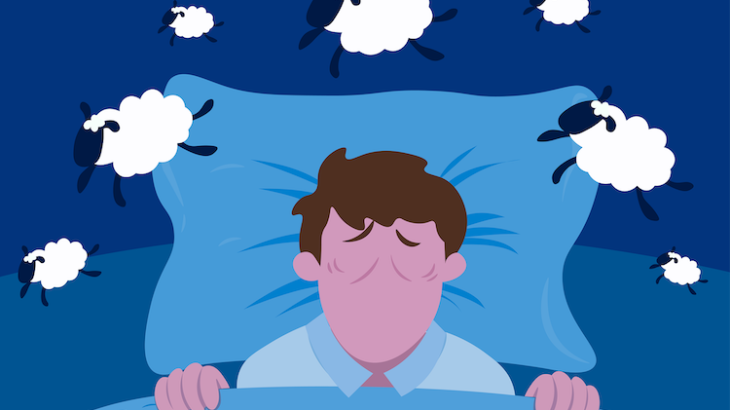Nada Salem and Zahra Nasser, Chemistry co-editors
Google searches for ‘insomnia’ have surged in the last few months, reflecting people’s concerns about their changing sleep patterns. Sleep is a complex process involving a network of mechanisms. When one mechanism falters, our sleep is negatively affected. An extreme example of this disruption is insomnia – a condition characterized by the difficulty of falling and staying asleep. The COVID-19 pandemic has only aggravated our sleep patterns even more, with some experts dubbing the crisis ‘covidsomnia’ in response to the spike in insomnia cases reported during the pandemic. It turns out that the transition to remote work and school, a measure taken to slow the spread of COVID-19, has been significantly impacting sleep habits.
Late last year, Dr. Rébecca Robillard, an assistant professor at the University of Ottawa, led a study on the effects of the COVID-19 pandemic on sleep profiles. Her research revealed that over half the study population was suffering from sleep difficulties due to the pandemic. Specifically, Robillard and her team found that waking up later in the day to work from home instead of commuting could make it difficult to sleep. The results showed that people who delayed their sleep-wake cycle (sleeping late and waking up late) had a harder time initiating sleep.
The researchers also found that coping strategies such as drinking alcohol or watching TV intensify sleep challenges. Alcohol interrupts REM sleep, the deepest stage of the sleep cycle when dreams occur, and TVs emit blue light that can disrupt our circadian rhythm.
So why are some of us currently suffering from more pronounced sleep challenges? And what can we do to restore our healthy sleep habits?
Blue light at night
Our bodies run on a tight schedule controlled by the circadian rhythm. The circadian rhythm works through a 24-hour cycle that is part of our internal biological clock. This cycle promotes consistent patterns in our sleep and appetite, which is why we generally eat and sleep at similar times every day. But when it’s thrown off, it disrupts our daily habits.

Blue light emitted by many of our devices plays a role in inhibiting melatonin release and preventing sleep. Image by cdd20, CC0, Pixabay
Melatonin is one of the neurochemicals that cycles with our circadian rhythm to induce sleep. During the day, the sun emits a blue wavelength of light that blocks melatonin production to keep us awake. The suprachiasmatic nucleus (SCN) is a cluster of specialized cells in our hypothalamus – a region in the brain governing our circadian rhythm – that receives information about light exposure and then suppresses melatonin. At night, in the absence of sunlight, our bodies produce melatonin when we feel the urge to sleep. What our bodies cannot account for are the phones and computers we use day and night that emit the same wavelength of blue light. While we’re stuck at home during the pandemic, many of us have transformed our bedrooms into makeshift offices and workspaces, making it even more difficult to avoid these devices at night.
A bilingual Canadian public health campaign developed by Dr. Julie Carrier called ‘Sleep On It!’ is creating awareness of how to achieve restful sleep during stressful times. It suggests unplugging from screens and staying away from blue light exposure at night. It also recommends going outside on a sunny day – something we often forget to do while isolated at home. Exposure to sunlight allows our bodies to generate vitamin D, which helps to regulate the precursors of melatonin.
“Sleep On It!’ is a bilingual campaign working to demystify sleep difficulties and offering solutions to people who suffer from insomnia and other sleep challenges. Their website and YouTube channel interviews experts and offers advice on getting more sleep in a time of crisis for children, adolescents, and adults.
The consistency of a daily routine
Our daily routine and external cues should align with our 24-hour biological clock. Establishing a consistent sleep routinecreates a synchronous rhythm for the hypothalamus and we become accustomed to triggering the release of melatonin at the same time every day. However, as our work, school, and lives continue to operate virtually, some of us no longer have the time cues we need to regulate our biological clocks, like commuting to work in the morning. The hypothalamus is forced to adjust its schedule when we change our time cues. This adjustment compromises our sleep cycles.
While some of us may not be obligated to live by a fixed schedule, waking up at the same time on a daily basis is still essential for maintaining our biological clock. Keeping a routine – scheduling meals, work, and social activities at consistent times – also helps us maintain our biological clocks.
Stress and anxiety
Different emotions trigger the release of specific neurotransmitters that can make the brain hyperactive. Stress, for example, releases cortisol and noradrenaline. These neurochemicals increase heart rate and cause heightened alertness.
Cortisol maintains its own circadian rhythm, with levels in the brain increasing rapidly when we wake up and slowly declining throughout the day before flat-lining around midnight. Constant stress keeps cortisol levels high and stops the brain from dialling down at night. Cortisol also raises the sleep wave frequency and decreases short-wave sleep (deep sleep), so the likelihood of waking up intermittently and having difficulty falling back asleep, a characteristic of insomnia, increases.
Just relax
It’s natural to feel more stressed than usual during times of crisis and uncertainty. But there are some things that you can do to minimize your stress levels, especially before going to bed. Setting aside an hour before bed to unwind from our busy lives can help relax the mind. ‘Sleep On It!’ suggests having a night time ritual that relaxes you – take a bath, read for pleasure, listen to calming music.

Image by Hatice EROL from Pixabay
While many people see our virtual lives as temporary, some workplaces are making work-from-home arrangements permanent. Paying attention to our sleep hygiene will help us adjust to our remote work environments and avoid the risk of developing chronic insomnia. As we continue to live our lives at home, let’s begin to make sleep a priority and establish healthy sleeping habits that set us up for success in the long term.
~




